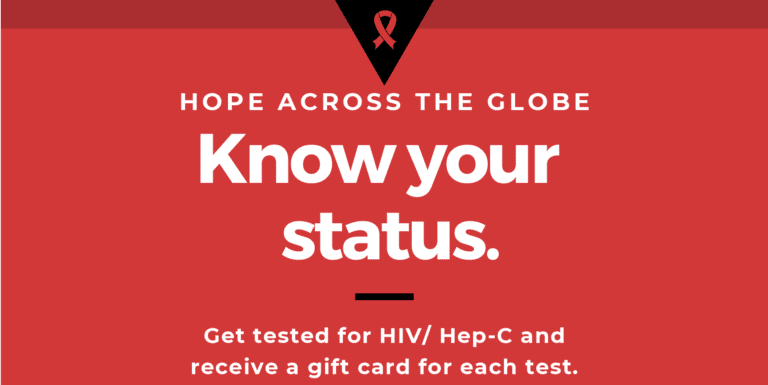Can You Catch Chlamydia Through Kissing?
In the realm of sexual health, misconceptions and questions often arise, and one query that frequently emerges is whether Chlamydia, a common sexually transmitted infection (STI), can be transmitted through kissing. This article aims to delve into the nuances of Chlamydia transmission, explicitly exploring the possibility of contracting the infection through kissing. As we navigate this topic, we’ll address common myths, clarify Chlamydia transmission methods, and emphasize the importance of Chlamydia testing. Welcome to an insightful exploration by Hope Across The Globe.
Understanding Chlamydia Transmission
Decoding Chlamydia Basics
Before exploring the intricate details of Chlamydia transmission, it’s imperative to establish a foundation for understanding the fundamental aspects of this bacterial infection. Chlamydia, caused by the bacterium Chlamydia trachomatis, is a pervasive sexually transmitted infection (STI) that can manifest in various parts of the body, including the genitals, throat, and rectum.
The Culprit: Chlamydia trachomatis
Chlamydia trachomatis, the causative agent, is a unique bacterium known for its ability to thrive within human cells. This intracellular lifestyle contributes to the challenges of diagnosing and treating Chlamydia effectively.
Diverse Manifestations
Chlamydia doesn’t limit itself to a singular anatomical site. Its impact can be felt in multiple areas, making it crucial to recognize the diverse manifestations of the infection. Whether it takes residence in the genital region, the throat, or the rectum, Chlamydia underscores the importance of comprehensive sexual health awareness.
Traditional Transmission Routes
The Sexual Sphere
Traditionally, Chlamydia has been recognized as an STI primarily transmitted through sexual activities. Unprotected sexual intercourse, encompassing genital, oral, or anal contact with an infected person, stands out as the principal mode of transmission. This characteristic has positioned Chlamydia as a significant concern for sexually active individuals across various demographics.
A Universal Concern
Chlamydia knows no boundaries when it comes to affecting individuals. Regardless of age, gender, or sexual orientation, anyone engaged in sexual activities is potentially at risk. This universality reinforces the importance of adopting safe sexual practices, regular STD testing, and open communication about sexual health.
The Expanding Horizon: Beyond Sexual Contact
Addressing the Question
As we explore the complexities of Chlamydia transmission, a question emerges: Can this infection extend its reach beyond the confines of sexual contact? Dispelling misconceptions and providing accurate information is crucial to addressing this query.
Understanding the Limits
While Chlamydia is predominantly transmitted through sexual activities, the risk of transmission through non-sexual means, such as kissing, is minimal. It’s vital to recognize the limits of Chlamydia’s transmission routes, dispelling myths and ensuring that accurate information guides discussions about sexual health.
The Kissing Conundrum
Dispelling Common Misconceptions
In the realm of sexual health, misinformation can lead to unwarranted concerns and anxiety. The persistent misconception that Chlamydia can be contracted through kissing is one such example, often fueled by a lack of clarity regarding the infection’s transmission methods. It is essential to address this myth head-on, providing accurate information to the public and fostering a more informed perspective on Chlamydia.
The Power of Education
Dispelling misconceptions begins with education. By offering clear and accurate information, we empower individuals to make informed decisions about their sexual health. Hope Across The Globe aims to illuminate the shadows of misinformation and promote a healthier understanding of Chlamydia transmission.
Can You Catch Chlamydia From Kissing?
The straightforward answer is a resounding no. Chlamydia, at its core, is primarily a sexually transmitted infection. The bacteria responsible for Chlamydia, Chlamydia trachomatis, typically require specific conditions for transmission. Unlike some other diseases, Chlamydia is not known to be transmitted through casual, non-sexual contact, such as kissing.
Transmission Specifics
Chlamydia transmission involves the exchange of bodily fluids containing the bacteria. Kissing, being a non-sexual activity, does not provide the necessary conditions for Chlamydia to thrive and spread. Understanding this fundamental aspect of the infection’s transmission is vital to dispelling fears and fostering a more accurate perception of Chlamydia.
Factors Influencing Transmission
While kissing itself is not a known method of Chlamydia transmission, it’s crucial to delve into the broader context of sexual activities and factors that contribute to the spread of the infection.
Oral-Genital Contact
Oral-genital contact, a more intimate form of interaction, can contribute to Chlamydia transmission. Engaging in sexual activities involving direct contact between the mouth and genital area creates an environment conducive to the spread of bacteria.
Exposure to Infected Bodily Fluids
The importance of understanding the broader context extends to recognizing the role of infected bodily fluids during intimate moments. Direct exposure to these fluids, particularly in the absence of protective measures, can facilitate Chlamydia transmission.
By fostering a comprehensive understanding of the factors influencing Chlamydia transmission, individuals can make informed decisions about their sexual health. The emphasis on responsible sexual practices, regular testing, and open communication forms the foundation of proactive measures to prevent the spread of Chlamydia.
The Role of Chlamydia Testing
Importance of Timely Testing
Proactive measures play a pivotal role in sexual health, and Chlamydia testing stands as a cornerstone in this pursuit. Timely testing is crucial for several reasons:
- offering individuals the opportunity to detect and address Chlamydia early on
- minimizing the risk of complications
- preventing the further spread of the infection
Asymptomatic Nature of Chlamydia
One of the challenges associated with Chlamydia lies in its often asymptomatic nature. Individuals infected with Chlamydia may not exhibit noticeable symptoms, making regular testing imperative for early detection. As the saying goes, “knowledge is power,” and in the case of Chlamydia, knowledge through testing empowers individuals to take control of their sexual health.
Preserving Reproductive Health
Chlamydia, if left untreated, can lead to severe complications, particularly for women. Untreated Chlamydia in women can result in pelvic inflammatory disease (PID), which, in turn, may cause infertility or complications during pregnancy. Timely testing becomes a proactive step in preserving reproductive health and ensuring a healthier future.
Recognizing Symptoms and Seeking Testing
While Chlamydia can often lurk without noticeable signs, recognizing symptoms when they do occur is equally essential. Symptoms may include abnormal discharge, painful urination, and abdominal pain. If individuals experience these symptoms or engage in behaviors that increase the risk of Chlamydia transmission, seeking prompt testing is paramount.
Encouraging Open Communication
Promoting open communication about sexual health is a fundamental aspect of Hope Across The Globe’s mission. Encouraging individuals to communicate openly with their healthcare providers about their sexual activities, concerns, and testing preferences fosters an environment where testing becomes a routine part of responsible sexual health management.
Also Read: HOW LONG CAN YOU HAVE HERPES WITHOUT KNOWING
Hope Across The Globe and Sexual Health Advocacy
Empowering Individuals Through Education
As a dedicated advocate for sexual health, Hope Across The Globe recognizes the importance of accurate information in dispelling myths surrounding STIs. Through education and awareness initiatives, we aim to empower individuals to make informed decisions about their sexual health, promoting a stigma-free environment for discussions about STIs.
Accessible STD Testing in Jacksonville, FL
Hope Across The Globe is committed to fostering accessible sexual health services, including STD testing in regions like Jacksonville, FL. We strive to contribute to a healthier, more informed community by facilitating testing and counselling services.
Conclusion
The question of whether you can catch Chlamydia through kissing is dispelled by scientific evidence. While kissing alone is not a known method of Chlamydia transmission, it’s crucial to maintain awareness of the broader context of sexual health. Regular Chlamydia testing, accessible through Hope Across The Globe initiatives, remains a vital component of responsible sexual health management. By dispelling myths, promoting accurate information, and advocating for accessible testing, we contribute to a world where individuals can navigate the realities of Chlamydia transmission with knowledge and empowerment.
Related Tag: STD Clinic Jacksonville FL






